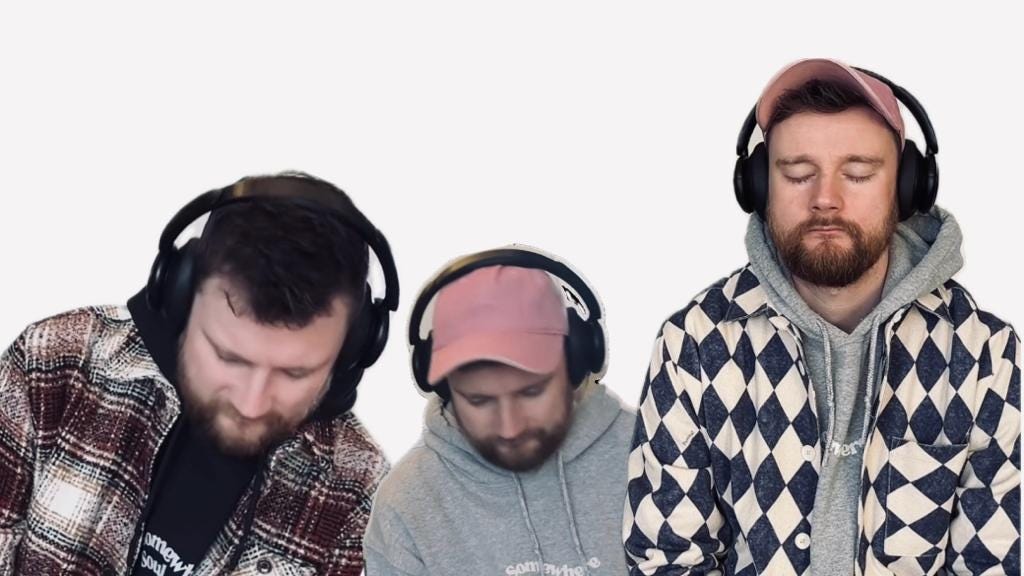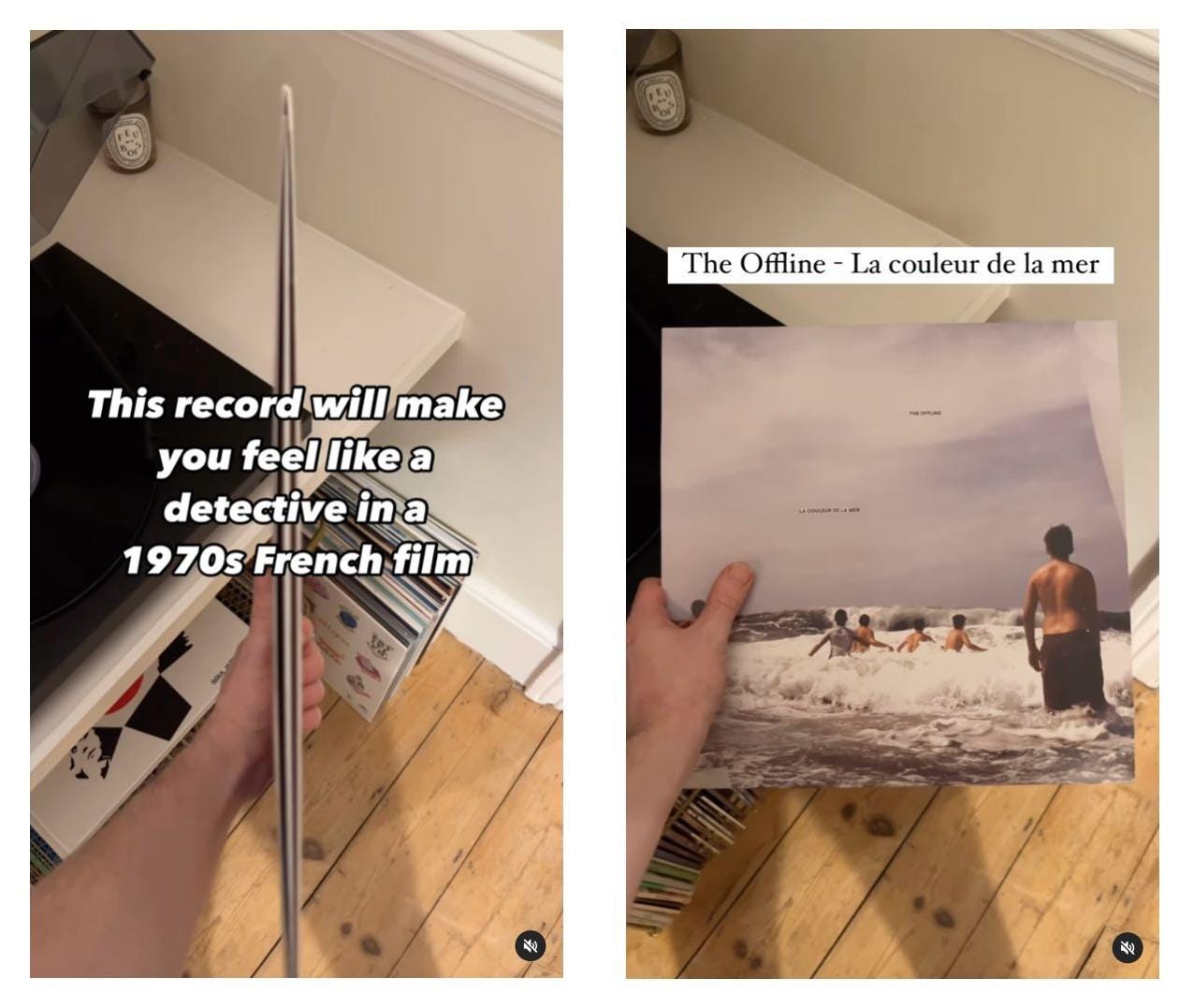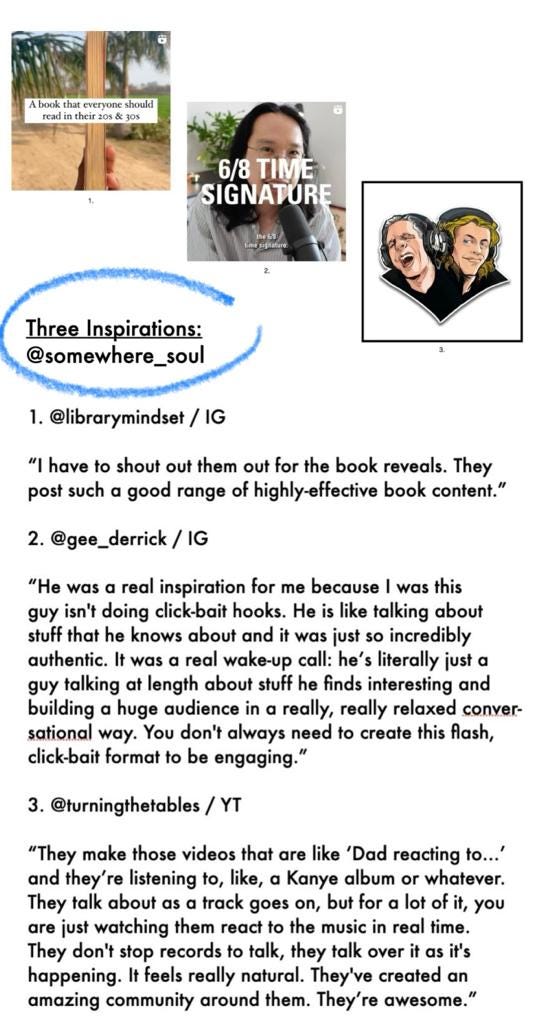no gatekeeping #1: the viral head nod
an interview about formats, strategy, and bowling shoes with Josh Mason-Quinn of Somewhere Soul
“I tested that change and it went super viral… I get comments like, ‘Love the music, but can you just stop bobbing your head?’”
Welcome to the first in my new interview series, No Gatekeeping. It’s about things you can learn from creative people in a range of different mediums making successful work in this incredibly daunting world.
For new readers: Why Are You Like This? is a free newsletter about stories, storytelling, and storytellers. Every Tuesday you’ll get a short essay/list and every other Thursday you’ll get a longer essay or interview, like No Gatekeeping.
I’m a writer and strategist whose job is to help shape the way we tell stories more effectively. I started this series because it felt our culture didn’t have a problem with quality, but with visibility. I wanted to help more people reach more people by talking to creators who do that better than pretty much anyone. (Not only because I’m the world’s soundest man, but because I’m sick of talented creatives feeling despondent about the world. And that feeling is contagious.)
Josh Mason-Quinn is a great place to start this series. His platform Somewhere Soul has been popping up on my Instagram for months now, my phone filling with his calming, bearded face and montotone voice; his head gently bobbing in time to jazz, funk, and soul from all over the world. The formats are pleasingly simple and the music recommendations reliably class.
Josh is a London-based former-artist manager, record label A&R, DJ, and digital marketer. He began Somewhere Soul six years ago, after finishing uni, moving to London, and finding blogging an easier way to field all of the music suggestions his friends asked him for. It all kinda snowballed from there.
Fast forward to January 2024 and it feels like there was a lot people could learn from a man who, less than three months ago, stumbled across a format that saw his videos jump from about 25ish-thousand views to regular six figure and occasional seven-figure hits, all while showcasing relatively niche genres of music. The proof’s in the pudding: His Instagram is currently sat at 654k followers. I predict the million mark will be reached in, like… April? Let’s say April.
(No jinxes, Josh. Sorry in advance, mate.)
This is a chat about strategy, about formats and finding what works for you. Josh not only works on his own page but 1-on-1 with artists who wanted to understand this stuff better themselves. So, this interview will be useful for any creative who wants to know how they can get more eyeballs on their work without selling their soul (or doing stupid dances [unless you really have to]).
If you enjoy this interview, please share it wherever you share things. It means a lot.
Sam: So, Josh, tell me about 'the nod'.
Josh: [laughs] It's funny. The reason I blew up on Instagram was purely just the change to that format: showing myself on-camera reacting to the music. It was a calculated thing: I was thinking about a lot of stuff that was working on TikTok — unboxing videos, reaction videos, all that. People watch people reacting to stuff. My stuff on Instagram wasn't doing well at all before that. So I tested that change and, yeah, it went super, super viral. And I get comments, like ‘Love the music. Can you just stop bobbing your head?’ I don't like it either! I would rather I didn't have to bump my head around but my goal is promoting the music. And I know that head bob is what's helping. I think people think I do it because I think I'm being cool and vibey, but it helps the reach and obviously helps more people can hear the music I’m nodding to. I did have a girl stare me down on the Elizabeth Line the other day and she was just like [mimes the patented ‘Somewhere Soul exaggerated head nod’] and I was like, 'Oh god, that's me. I'm the head nod guy.'
I know the algorithm has its own little quirks and mysteries, but why do you think that sorta stuff works so well on social media?
I think people are inherently interested in people. Maybe the nod is a very mild version of viral TikTok dances because what's on screen is constantly moving. I'm never going to dance on camera, because that's just not me. I would not feel comfortable dancing and then adding my music theory lens after that. But I was like, 'I could bob my head. I could try that.' Before that I post videos with music covering the whole screen, with a graphic behind it. But to be engaging on TikTok and Instagram, what's on screen needs to be constantly moving, constantly changing. Every few seconds something has to change, that's the rule.
You’ve been testing out other more-simplified formats, too. Tell me about that process.
So I introduced a new format recently—literally just a 15-second video of me turning a record around. I’ll tell you why: As my audience has grown, I’ve been increasingly busy with non-creation stuff so I needed a short-form format that will let me keep up the content output. The longer videos take me three hours to make. It's not sustainable to post those on a regular basis with a hectic schedule. So that format has been shorter-form tests. I saw the idea used in a bunch of book-related Instagram accounts, they do this thing where they show the pages and then they reveal the book—so simple and satisfying and appeasing the Instagram algorithm’s love for a hook-and-reveal. I tried that and the first one did crazy well. Now they do better than my longer videos. I wouldn't want it to just be those because then there's no connection to to like me as a person, what I think or have to say. But I was forced to try a new format just thinking about life in the not too distant future, really. Which I think has to be the same for artists if you're stuck in the middle of something. You’re not always going to have the time to post what you want. But I could have just kept at it being like, ‘Oh, well this works: I’ll just do that forever’. But I'd rather be trying that stuff now and finding out what works than testing out social media formats when I’m chaotically busy with other things.
I think there’s a tricky tension between creativity and operating inside the confines of a medium. There are a million ways to stretch it, mutate it, fuck with it: but at the end of the day, you have to play within the lines provided. How do you feel about that?
Definitely. I see it a lot on Threads these days; so many posts slamming the algorithm, pointing fingers at the algorithm, being like, 'Reach has dropped. It's changed. Instagram sucks as your platform now.' And it's just never been my experience of social media platforms. My experience has always been if things aren't working, try different things, change things, and you can change the result. I don't think it's very helpful to just feel like you're a prisoner to the algorithm: you've got to try and strike a balance between what feels authentic to you, but also what makes sense to the platform and what will work for the algorithm. I think a lot of artists are definitely stuck in a place where they feel like they can't be authentic and that they would just be sort of selling themselves out to try some of these sorta gimmicky things. I've always seen it like wearing bowling shoes in the bowling alley. Like I'm never judging anyone's shoes in a bowling alley. They're in the right context. Being on social media is important now. Ultimately I'll judge an artist for their music: if I see them posting something a bit gimmicky on social media, I just think they're trying to promote their art. I never think artists are selling out by jumping on a trend. There's obviously a line but, yeah, I do think there's lots of artists who maybe take themselves a bit too seriously, or they think others will judge them if they put stuff out that isn't super serious and authentic. Obviously, most of them would just rather not be doing any of it at all.
I wrote in my last newsletter about the idea of platform classism. The idea that there are some inherently more worthy platforms than others. Vertical video is considered by many to be the death knell of, well, everything. But, as you say, it feels like you can find your sweet spot and if you tweak it and test-and-learn, that will eventually be rewarded.
I often get asked by mates or people in the industry if I would do a radio show. I feel like to the music industry, radio is still very much seen as the ultimate goal. But I've done radio before and seen the numbers and the stats, and it just doesn't feel like a very effective way to promote music and to convert listeners to streams and record sales. I've always felt like the music industry is quite slow to catch up. I did a poll on my Stories and asked ‘How do you discover new music?’ I had thousands of responses and about four people said radio. Yet everyone still seems to see that as like the place to go.
I suppose there are ways of making something more traditional like a radio show work, but they exist on YouTube, in nicely shot, impeccably-curated spaces—like on the channel My Analog Journal. Do you tell people ‘Yes, these formats still can be done, but not in the old way’ or do you think they just aren’t ready to hear that yet?
It’s very simple for me: the goal is purely to amplify artists I believe in as much as possible. A podcast or a radio show: I just know they're less effective vehicles for me to do that than Instagram or TikTok. Or like growing a YouTube channel in the future, for example. There’s already a totally insane amount of plates artists have to spin and, if they don't have a team or label, it can feel like there's just so much to do: ‘Should I focus on TikTok? Instagram? YouTube? Focus on getting on playlists?’ It can be super overwhelming. But I definitely think there is an element of finding a platform that works for them. Some artists do much better on Instagram than TikTok. Some artists on TikTok, they're a bit more personality-led: they're posting all sorts of different things, they're not just posting music. And then there's others who look to crack a certain format on Reels, and they do the same thing over and over and that blows them up. It's just about testing and experimenting on more than one platform, and trying to find something that works for you. It doesn't take away from your art, but it’s something that complements what you're doing without taking over—because, having said that, I do know artists that have had to take a break from music for a year to just focus on socials. It sounds crazy but it goes to show how much of a drain it is to try to do both at the same time.
Why do you feel this genre of jazz-inflected soul is resonating with people? Was this just the natural progression from the ‘anime girl listening to lofi beats’ era?
It’s good timing. Jazz is thriving, particularly the UK jazz scene. I also think listeners discovered they could only get so far with the algorithm alone. People just don't realise something is actually for them until you put it in front of them. The algorithm on Spotify is never going to be like ‘Oh, you listen to a lot of UK R&B? Why not listen to some 1970s Turkish folk music.’ It will just keep feeding you the same. I think people have been waking up a little from algorithms maybe. I’ve been overwhelmed by the amount of comments and DMs I get from people saying they have no idea how to find new music or that they just don't have the time to stay on top of it.
But it’s all out there, right? I think what's interesting to me is the point that you touched on there: this stuff hasn't really stopped coming out; good work is always out there. Do you feel like the issue isn’t the algo, but the gap between what we want and what we're willing to do to find it?
One hundred percent. Are people willing to listen to a mix or a radio show just to find one gem? I think people want the end result but they're not willing to dig for an hour to find it. Maybe other people don't enjoy that process and won't be excited about the prospect of finding something special. But, like, you have access to every song in the world for like a tenner a month. To not dive into that, as a music fan, feels crazy. I do have to admit that, the more the platform has grown, the more connections I've built with artists and record labels and PRs, it has become easier to stay on top of stuff because people are sending me stuff now.
But you put the work in before that. Pitchfork’s folding into GQ has reignited the debates around criticism, and what and who it’s really for, versus curation, and who should be allowed to do that. What’s your take?
I think I always read Pitchfork for the quality of the music journalism and its features rather than reviews. As a music fan, I guess I just can't understand having the motivation to talk about something or share something that you didn't like. It would never be something that I’d want to venture into because, personally, it wouldn't feel good. But often I put out stuff I like and people critique songs in the comments anyway. You end up with, if not quite a balanced discussion, then at least an organic one.
[Quick note: I can’t put a caption on a video—thanks, Substack—but here’s a track from John Roseboro’s album Jonny, which Josh picked as his album of the year from 2023. It’s a scorcher.]
It’s a different way of doing it, right? Do you feel like the culture has moved away from having these hallowed critics and publications that everyone's trying to impress and who can ‘make or break’ a record? It now feels like we’re at a time when people appreciate someone presenting the art and creating the space for people to sound off in the comments, to start conversation about it themselves with the creator able to weigh in or not, as they please.
It’s just like the change in news and politics. People will be like, ‘Follow this person. They're really good to follow for this story.’ It removes the sense of like, ‘Oh, can I trust the company that runs this website?’. I read Pitchfork for the quality of the writing more than the recommendations. But I think people are becoming less interested in brands and more interested in people. That’s why, when I started on TikTok, I set my profile as myself rather than Somewhere Soul.
Why did you make that decision?
There was always a part of me that regretted not launching from the beginning as myself. Social media was a very different time then: there was less like video focus, I wasn't interested in being on camera. It was more about photos and graphic design posts. I felt like I had to have a brand name and stuff. But with TikTok, I knew it was ultimately a platform for people connecting with other people. I didn’t want to launch it there with a logo. I've sort of kept Instagram the same because it's always been that way, even though all my videos are just like my face. But I think if I switched it tomorrow to my name, no one would really care. I guess the brand name does allow for opportunities like, I don’t know, doing a stage at a festival or something that may come up in the future.
Do you think creatives come up against making a difficult decision about how much of themselves they want to cannibalise for their art and so ‘hide’ behind a brand name?
Yeah, I think so. The brand can always come later. And it's much more about how you get people bought into you first, before you grow an audience of people that like what you do. If that goes well, and then you want to add a brand to it, you can do that. I think, in the early days, there was definitely an element of needing to ‘seem professional’—with a logo and stuff like that. That isn't the landscape anymore. I think it's more about you, what you say, and what you put out there.








Great interview!